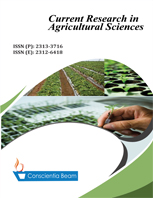Genotype X Environment Interaction and Stability Analysis for Yield and Yield Related Traits of Desi-Type Chickpea (Cicer Arietinum L.) In Ethiopia
DOI:
https://doi.org/10.18488/journal.68/2015.2.3/68.3.100.113Abstract
Chickpea is the major pulses grown in Ethiopia, mainly by subsistence farmers usually under rain-fed conditions. However, its production is constrained due to genotype instability, environmental variability and interaction of genotype with environment. This research was carried out to examine the magnitude of environmental effect on yield of chickpea genotypes and to investigate the stability and adaptability of the genotypes under different agro-ecological conditions. 17 genotypes each of were evaluated in RCBD with four replications in five environments. Various stability indices were used to assess stability and genotype by environment performances. The combined ANOVA for yield and yield related traits revealed highly significant (P≤0.01) differences for genotypes, environments and their interaction. The significant interaction showed that the genotypes respond differently across the various environments. At Akaki, Chefe Donsa, Debre Zeit, Dembia and Haramaya the top performing genotype were DZ-2012-CK-0040 (2229 kg/ha), DZ-2012-CK-0027 (3966 kg/ha), DZ-2012-CK-0040 (4060 kg/ha), DZ-2012-CK-0032 (1394 kg/ha) and Natoli (3247 kg/ha) respectively. The first two PCs explained 84.3% of the variance of original variables for the genotypes. There were remarkable inconsistencies with the univariate stability parameters to select stable genotypes. However, multivariate approach, the AMMI model was better for partitioning the G x E into the causes of variation. Based on ASV value, DZ-2012-CK-0035 was most stable genotype. As per AMMI biplot, Minjar and local variety were the most widely adapted genotypes. Dembia and Haramaya are the most discriminative environments. Environments Debre Zeit and Chefe Donsa were the favorable environment. Genotypes, DZ-2012-CK-0040, DZ-2012-CK-0036 and DZ-2012-CK-0040, DZ-2012-CK-0032 and variety Natoli were recommended as specifically adapted to sites Akaki, Chefe Donsa, Debre Zeit, Dembia and Haramaya respectively.

